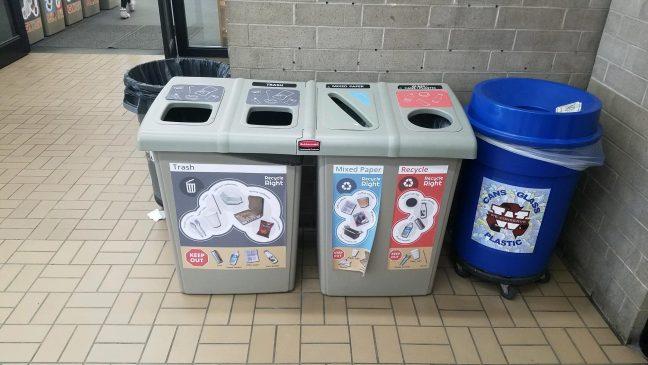After China implemented a new set of standards for importing recyclable goods in 2017, waste management operations in Madison find themselves at a financial downturn.
Recycling and sustainability have always been pillars of Madison’s identity, Bryan Johnson, the City of Madison recycling coordinator, said. He said Madison has been a city of sustainability for over 50 years.
The city has earned its stripes as a hub for recycling, adding an impressive number of items to its list of what may be recycled, many of which are regarded as trash by other cities and towns across Wisconsin.
“Styrofoam is something that is very unique to us,” Johnson said. “You don’t put it in your cart, but if you bring it to a drop off site, there’s actually a spot in Waunakee that accepts it to recycle it. Also we’re unique in the way we do plastic bags as a city, where you have to bundle them, but bundled plastic bags are something that can go in your recycling cart.”
Madison’s Department of Waste Management sends out crews to collect recyclable waste from residencies. Materials are then delivered to competitors such as Pellitteri Waste Systems, which are responsible for purchasing, processing and reselling recyclables.
Leaders in campus sustainability weigh in on University efforts to combat climate change
As expansive as the departments’s efforts to collect recyclable materials are, Lynn Morgan, Madison’s Public Affairs Manager for Waste Management, said limits on recyclable pick up do exist. Morgan said the city imposes restrictions on what buildings and residencies are integrated into the department’s grid.
“The way that things are structured, the City of Madison collects recyclables from residences — single family and, I believe, up to four family units within the city,” Morgan said.
But such restrictions hardly make life easy for waste management. Madison imports recyclables from other, less eco-friendly locations and that these efforts originally served to significantly increase revenue brought in by the city. But in the wake of new restrictions placed on imported recyclables by China, both Pellitteri and Madison’s profits have been measurably reduced.
UW ranks last out of all Big Ten schools for sustainability, announces sustainability council
Johnson said China emerged in the 1990s as a pioneer of recyclable material trading. As a result, corporations and governments alike sold their recyclable waste to China as a system of trade that initially appeared mutually beneficial.
But as more and more recyclable material made its way to China, the nation soon realized it was also sorting through non-recyclables and could no longer sustain such a massive influx of garbage. In response, the government placed a series of quality and cleanliness quotas on incoming recyclable goods, Johnson said.
As a result, Johnson said, companies that originally processed and sold waste from Madison have been forced to reduce the amount of waste they purchase from the city, while simultaneously increasing purity requirements for waste materials they are willing to accept.
Consequentially, Johnson said media outlets and citizens of Madison alike often point to a “recycling crisis,” unfolding in the city. He added, however, he thinks this is a mischaracterization of an issue he sees tied more to supply and demand than the functional abilities of the Department of Waste Management, both in Madison and across the country
“The money is what’s driving all the headlines that are saying ‘recycling is in crisis,’” Johnson said. “You know, that’s a money problem, not a system problem. The recycling system still functions, the money’s just not there like it once was.”
Morgan echoed similar sentiments, saying that collection procedures by Madison’s Department of Waste Management have been thorough and up to the task.
Morgan described the company Pellitteri as the primary processor of recyclable materials for the city of Madison and said many outside the business frequently conflate the responsibilities of the two distinct entities.
“There’s quite often confusion along this because people hear ‘Waste Management’ and what have you and they may be looking for a city and find their way to us,” Morgan said.
Yet the City of Madison continues to lose money as recycled materials are left unused by companies like Pellitteri, while those goods which are processed are purchased for significantly cheaper.
But Johnson believes that through grass-roots efforts, the citizens of Madison themselves may hold a critical role in reversing the impending “recycling crisis,” threatening Madison.
“I would just encourage the people of Madison to continue to help,” Johnson said. “For one thing, keep recycling because yes, it matters, and keep it clean.”














